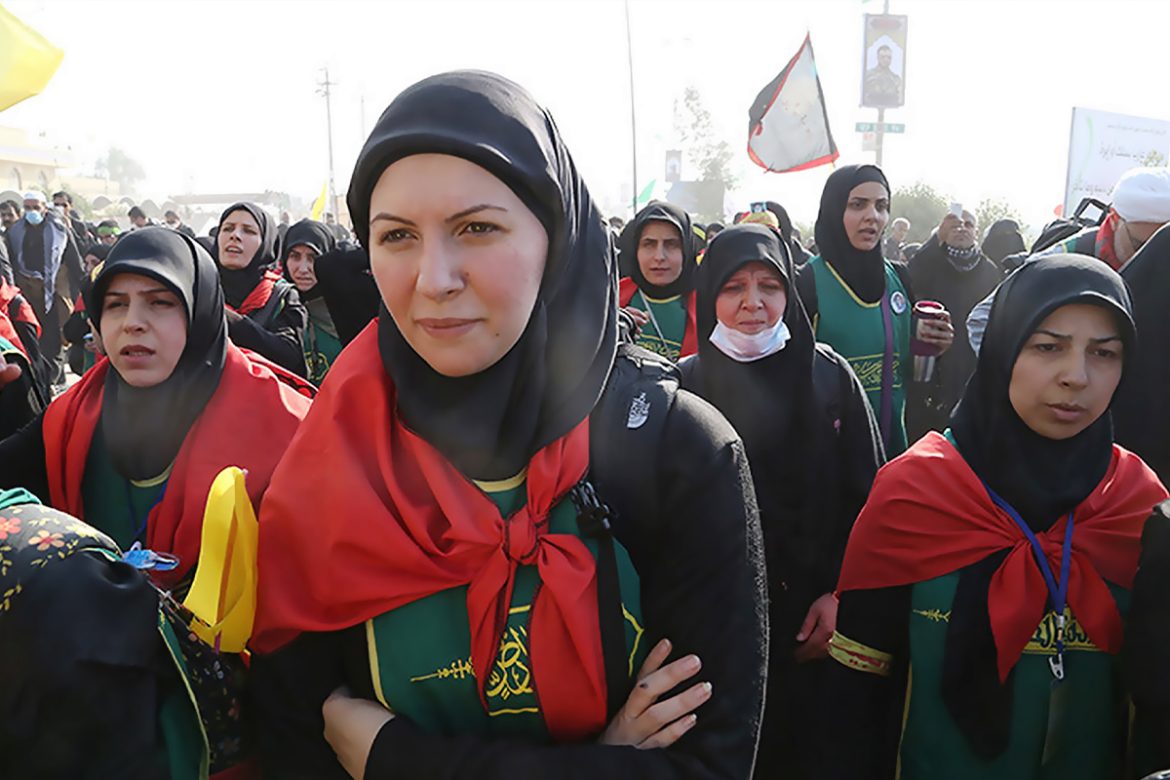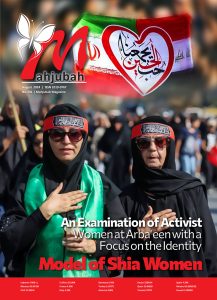This article investigates the role of activist Shia women during the Arba’een ceremonies. Utilizing a qualitative research approach, it explores women who purposefully participate in these events and strive to emulate the identity models of Shia women, such as Lady Fatima and Lady Zainab.
The research findings indicate that the Arba’een ceremonies provide a conducive environment for spiritual and identity connections with these models. However, due to a lack of sufficient understanding of these figures, mere participation in the ceremonies does not necessarily offer an identity-oriented approach for the attending women.
Keywords: Arba’een, Shia Women, Lady Zainab, Religious Identity.
Introduction
Islam and Shia Islam recognize women as active and influential subjects in the propagation of religion and assign them a significant identity role. Prophet Muhammad advanced his mission with the support of his wife Khadijah and his daughter Fatimah. Following the Prophet’s death, the Shia Imams continued to highlight the roles of women, such as Lady Zainab, during events like Ashura.
The Role of Women in Intellectual and Social Movements
Contemporary Muslim women have played significant roles in various movements, such as the Islamic Revolution in Iran. The Shia heritage provides a path distinct from feminism for Muslim women. During Arba’een, women actively participate in social and spiritual life by following Shia identity models such as Fatimah and Zainab.
Impact of the Arba’een Ceremony
The Arba’een ceremonies offer a suitable context for women to connect with Shia identity models. Female pilgrims, identifying with Lady Zainab—a figure who endured considerable suffering—find greater motivation to participate in the Arba’een pilgrimage. This participation helps women to reassess and strengthen their identity as Shia women.
Activist Women in the Ritual Context of Arba’een
In the ritualistic space of Arba’een, activist women, through their interactions with believers and religious advocacy centers, become potential religious promoters. By engaging in social and cultural activities, they comprehend feminist discourses and seek to represent and reinforce the authentic identity model of Shia women.
Conclusion
The Arba’een ceremonies provide an appropriate context for women to connect with Shia identity models. By striving to align themselves with figures such as Lady Fatimah and Lady Zainab, these women seek to establish an identity beyond being mere objects of gender. This study examines the identity characteristics of these women and their relationship with the identity models of Shia women.
Conceptual Framework Personal and Social Identity:
Identity can be defined as a collection of personal and social characteristics, attributes, emotions, and thoughts through which an individual achieves self-perception and self-concept. According to many theorists of personality, identity is a personal matter that denotes a sense of distinction, continuity, and personal autonomy. It is a prerequisite for any form of social life as it enables the establishment of enduring and meaningful relationships with others.
Social Identity:
Social identity not only facilitates social interactions but also provides meaning to individuals’ lives. The significance of identity implies its constructed nature, meaning that identity is the result of agreements or disagreements and thus encompasses emotions and thoughts associated with them, which individuals achieve through self-interaction and the formation of self-concepts.
Bourdieu’s Theory:
Bourdieu considers the reciprocal relationship between fields and both objective and subjective or cognitive structures through which individuals engage with the social world. Lifestyle and capital are interrelated concepts that mutually influence each other. Individuals choose a particular lifestyle based on the type and amount of capital they possess.
Bourdieu’s Forms of Capital:
Bourdieu identifies four types of capital:
– Economic Capital: Measured in terms of money, assets, and property.
– Cultural Capital: Related to education, academic qualifications, expertise, and skills.
– Social Capital: Refers to the network of social connections and the scope of individuals, groups, or communities.
– Symbolic Capital: A specific form of cultural capital that pertains to prestige, status, and honors achieved by individuals within society.
Field and Habitus:
Actions and behaviors are products of individuals’ habitus within a field of practice. The key to relationships, interactions, and actions of individuals is realized within a social space referred to by Bourdieu as a field.
 Ritual Space of Arba’een:
Ritual Space of Arba’een:
The ritual space of Arba’een provides a condu- cive environment for women to connect with Shia identity models such as Lady Zainab. By participat- ing in this space, women not only strengthen their identity values as Shia women but also have the op- portunity to internalize new meanings and identity characteristics through reflective and re-evaluative engagement in a supportive religious environment with other Shia Muslims.
The spectrum of women present in the ritual space of Arba’een includes active participants and promot- ers of religious culture. Their presence allows them to draw inspiration from historical figures like Lady Zainab and Lady Fatimah, thereby reproducing their religious beliefs and values. They refine and extract new mean- ings and values appropriate to their contemporary era from the examples and teachings of the Imams. The ritual space of Arba’een plays a crucial role in shaping the identity perception of various social groups and serves as a platform for linking belief systems and be- haviors with the construction of religious practices.
The presented article analyzes the social identity of female pilgrims in the Arba’een field, examining vari- ous identity characteristics. The findings are presented in four main sections: religious beliefs, attitudes and values, social roles, and fundamental trust. These sec- tions are detailed as follows:
- Religious Beliefs
The female pilgrims at Arba’een hold specific religious beliefs that generally encompass fun- damental Islamic principles such as monotheism, prophethood, the afterlife, justice, and leader- ship. They believe in the necessity of religious practices such as prayer, fasting, almsgiving, and pilgrimage, as well as observing modesty and re- specting others’ rights. These beliefs, along with their faith in the leadership of the Ahl al-Bayt (Household of the Prophet), play a significant role in shaping their religious identity.
Example: One of the interviewees referred to the im- pact of pilgrimage as a sacred legacy from Lady Zahra and Lady Zainab, while another mentioned her efforts to follow Islamic models, including Lady Fatimah and Lady Zainab.
- Attitudes and Values
The attitudes of female pilgrims towards identity
models such as Lady Fatimah and Lady Zainab are
highly significant. Many of them strive to shape their identity by emulating the personal and social charac- teristics of these figures. This attitude includes efforts to embody the traits of these revered personalities and adhere to their teachings.
Example: One interviewee stated that she is working towards emulating the personal qualities of Lady Fati- mah and Lady Zainab, whereas another admitted that despite her efforts, she has not been able to reach the level of their lives.
- Social Roles
Female pilgrims at Arba’een play crucial roles in vari- ous social and cultural domains. Roles such as being a wife, mother, and engaging in social, cultural, and political activities are highly significant to them. Some women believe that their roles as wives and mothers take precedence over other roles, while still valuing their social and cultural contributions.
Example: One interviewee highlighted the impor- tance of her role as a wife and the upbringing of her children, whereas another emphasized that social and cultural activities provide her with energy and vitality.
- Fundamental Trust
Fundamental trust is another crucial identity marker for female pilgrims. This trust supports their religious beliefs and efforts towards religious and cultural goals, helping them remain hopeful and resilient in the face of challenges and setbacks. It also encompasses trust in their social and cultural roles and the positive impact these roles have on society.
Example: One interviewee mentioned that despite difficulties and setbacks, she has never lost her deter- mination and hope, believing that fulfilling religious duties is important regardless of the outcomes.
These findings highlight the significance of reli- gious beliefs, attitudes towards identity models, social roles, and fundamental trust in shaping the social identity of female pilgrims at Arba’een and of- fer a deeper and more comprehensive analysis of these aspects.
- Body Care
Some interviewees emphasized the importance of body care, noting that it should be attended to from childhood. However, others have faced issues due to a lack of attention to this matter from a young age. Exer- cise and body care are considered essential for main- taining health and bodily beauty.
- Lifestyle
According to Bourdieu’s theories, lifestyle and capital (both material and cultural) have a reciprocal influence on each other. The women studied in this research generally belong to the middle or lower social classes but hold higher positions in terms of cultural capital. These women are often active in cultural and religious activities and play significant roles, particularly in educational and promotional fields.
Subjects and the Arba’een Field
Presence and Activist Activities:
Most female pilgrims have participated in the Arba’een pilgrimage for nearly a decade, engaging in promotional and cultural activities. These women in- clude university professors, writers, and researchers who, through their travels to Iraq and various activities along the Arba’een route, contribute to the promotion of religious and cultural values.
Attitudes Towards Arba’een:
For many women, Arba’een represents an oppor- tunity to renew their commitment to the Ahl al-Bayt and experience empathy with Lady Zainab and other members of the Ahl al-Bayt. They view Arba’een as a chance to gain a deeper understanding of their cultural and religious beliefs and to establish an emotional con- nection with religious figures.
Conclusion:
Activist women participating in the Arba’een pil- grimage possess distinct identity models that include a commitment to religious principles, a dedication to ed- ucation, and engagement in cultural activities. Many of these women are in economically disadvantaged positions due to limited financial resources, yet they possess high levels of cultural capital. These women are highly committed and active in their religious and cultural endeavors, with their participation in Arba’een being recognized as a profound cultural and spiritual experience. Although their understanding of identity modeling may be incomplete, the effort to pursue and strengthen this understanding is of great impor- tance. The text provides a comprehensive examina- tion of the experiences and roles of these women in the Arba’een pilgrimage and their impact on their identity and activities.
https://www.noormags.ir/view/fa/articlepage/2112522/
by: Nasim Kahirdeh, Saeedeh Davari Moghaddam
View this article in Mahjubah 341





